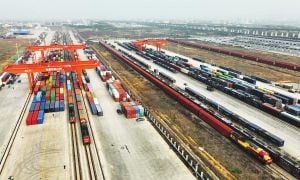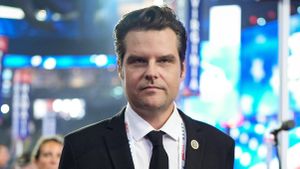Protests erupted fiercely at the pro-Israel gala held on Wednesday night in Paris, organized by far-right figures eager to raise funds for the Israeli military. The atmosphere was charged, especially as this event coincided with the UEFA Nations League soccer match scheduled against the Israeli national team. French authorities braced for the demonstrations with a substantial security presence, deploying over 4,000 police officers and 1,600 stadium staff to maintain order.
The gala, named "Israel is Forever," had been mired in controversy before it even began. Israeli Finance Minister Bezalel Smotrich was among the high-profile guests slated to attend, leading to outrage from local unions, political groups, and various community associations. Activists were particularly incensed by Smotrich's noted support for Israeli settlements and his recent comments which many perceived as incendiary, such as his hope for Donald Trump’s election to facilitate the annexation of the West Bank—an act viewed as detrimental to the aspirations of Palestinian statehood.
On the night of the gala, several hundred demonstrators marched through central Paris brandishing signs and voices raised against what they termed the "gala of hatred and shame." Protester Melkir Saib voiced their frustrations, pointing out the ironic double standards of hosting such events, saying, "Imagine if there were a gala for Hezbollah or Hamas—there’s no way the police would allow it. The situation is just unfair." Despite the fervor of the protests, most remained peaceful, aside from isolated incidents where windows of businesses were vandalized.
The criticisms surrounding the gala were echoed by the French Foreign Ministry, which labeled Smotrich's remarks as "contrary to international law" and not conducive to alleviating tensions across religious and political divides. This pushback came after Smotrich’s inflammatory remarks about civilians during the 2023 Israel-Hamas war surfaced—particularly, the president of the organization behind the gala, Nili Kupfer-Naouri, who previously stated, "No civilian in Gaza was innocent," adding fuel to the fire of public outrage.
Interestingly, the protests led to two separate demonstrations within the city. One was organized by local activists against Smotrich and the event itself, and another group consisting of Jewish leftist organizations gathered near the iconic Arc de Triomphe. They expressed their dissent not only against the gala but also against racism and antisemitism—issues they claimed were exacerbated by polarizing political events like these.
While the demonstrations took center stage, the soccer match between France and Israel was looming. Notably, the attendance for the match had been reported low, with only about 20,000 tickets sold out of an available 80,000. Nonetheless, supporters for both teams arrived under police escort, some waving flags within the stadium.
Security plays were tight during the match, implemented partly due to previous unrest observed during similar sporting events. Following violent encounters during the Europa League matches last year, where fans from Ajax and Maccabi Tel Aviv clashed, the French authorities were particularly cautious, implementing heavy surveillance of the area surrounding the stadium.
French Interior Minister Bruno Retailleau emphasized the importance of maintaining public safety, insisting it was "out of the question" to ignore potential threats reminiscent of the chaos experienced during the Europa League match. Unfortunately, Paris has memories associated with past instances of violence, including the November 2015 attacks where numerous individuals lost their lives, causing heightened security concerns.
Hours prior to the kick-off, another demonstration occurred near Saint-Denis, this time intentionally aimed at protesting the match itself. While several hundred made their presence known, this protest was reported as incident-free, showing the organization of dissent was overall well-coordinated. The elite tactical unit of the French National Police, known as RAID, monitored the stadium environment closely, ensuring security measures were effectively enforced.
From the streets of Paris to the soccer pitch, the events illustrated the deep divisions and heightened tensions surrounding Israel's military policy and the Palestinian struggle for recognition. With public sentiment encompassing both support and dissent, the atmosphere of the night reflected broader geopolitical conflicts gripping not only the region but influencing international sentiments right from the heart of Europe.
The protests encapsulated the complex dynamic of wrestling between national pride, international law, and human rights within the frameworks of cultural events like galas and sporting matches. Participants from various fronts called for awareness and change, reminding all observers of the human stories often overshadowed by political narratives and military support of foreign nations. Without a doubt, Paris remains at the crossroads of passionate discourse on Israel's military actions and the future of many lives caught within the fray.



